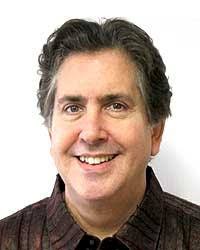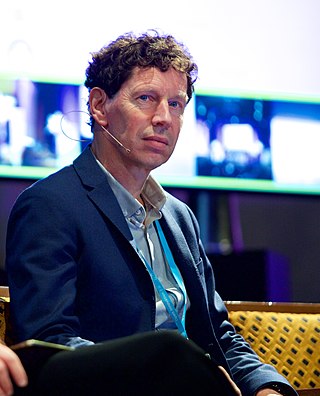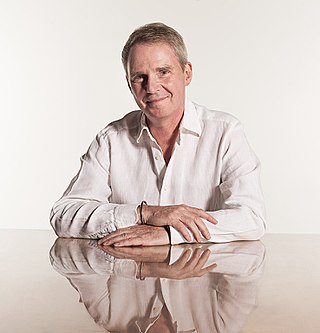
Michael F. Uschold (born 1955) is an American computer scientist, Artificial Intelligence researcher, and consultant known for his work on knowledge representation and ontology. [1] [2]

Michael F. Uschold (born 1955) is an American computer scientist, Artificial Intelligence researcher, and consultant known for his work on knowledge representation and ontology. [1] [2]
Uschold received his BA in Mathematics and Physics in 1977 from Canisius College, his MS in Computer Science in 1981 from Rutgers University, and his Ph.D. in Artificial Intelligence in 1991 from the University of Edinburgh. [3]
In 1983, Uschold joined the faculty of the University of Edinburgh, Department of Artificial Intelligence, as a researcher and lecturer, and later moved to its Artificial Intelligence Applications Institute. In 1997, he left the academic world and became a research scientist at Boeing Phantom Works, a division of The Boeing Company, specializing in advanced prototyping. In 2007, he became a senior ontologist at a computer science consulting firm; in 2009, he started as an independent consultant; and since 2010, he has participated in a management consulting firm. [3]
Uschold's research interests and expertise are in the fields of "software concept design and architecture; facilitation, analysis, and modeling; asking probing questions; getting to the heart of the matter; and communication of complex information in simple terms. Writing, speaking, and presenting; constructive reviewing and critiquing; and semantic technology." [3]
Papers and articles, a selection:

Cyc is a long-term artificial intelligence project that aims to assemble a comprehensive ontology and knowledge base that spans the basic concepts and rules about how the world works. Hoping to capture common sense knowledge, Cyc focuses on implicit knowledge that other AI platforms may take for granted. This is contrasted with facts one might find somewhere on the internet or retrieve via a search engine or Wikipedia. Cyc enables semantic reasoners to perform human-like reasoning and be less "brittle" when confronted with novel situations.
In information science, an ontology encompasses a representation, formal naming, and definitions of the categories, properties, and relations between the concepts, data, or entities that pertain to one, many, or all domains of discourse. More simply, an ontology is a way of showing the properties of a subject area and how they are related, by defining a set of terms and relational expressions that represent the entities in that subject area. The field which studies ontologies so conceived is sometimes referred to as applied ontology.

Douglas Bruce Lenat was an American computer scientist and researcher in artificial intelligence who was the founder and CEO of Cycorp, Inc. in Austin, Texas.
John Florian Sowa is an American computer scientist, an expert in artificial intelligence and computer design, and the inventor of conceptual graphs.
Knowledge engineering (KE) refers to all technical, scientific and social aspects involved in building, maintaining and using knowledge-based systems.

The School of Informatics is an academic unit of the University of Edinburgh, in Scotland, responsible for research, teaching, outreach and commercialisation in informatics. It was created in 1998 from the former department of artificial intelligence, the Centre for Cognitive Science and the department of computer science, along with the Artificial Intelligence Applications Institute (AIAI) and the Human Communication Research Centre.
Patrick John Hayes FAAAI is a British computer scientist who lives and works in the United States. As of March 2006, he is a senior research scientist at the Institute for Human and Machine Cognition in Pensacola, Florida.
Richard Earl Fikes is a computer scientist and Professor (Research) Emeritus in the Computer Science department of Stanford University. He is professionally active as a consultant and expert witness. He led Stanford's Knowledge Systems Laboratory from 1991 to 2006, and has held appointments at Berkeley, Carnegie-Mellon, Price Waterhouse Technology Centre, Xerox PARC, and SRI International.

Frank van Harmelen is a Dutch computer scientist and professor in Knowledge Representation & Reasoning in the AI department at the Vrije Universiteit Amsterdam. He was scientific director of the LarKC project (2008-2011), "aiming to develop the Large Knowledge Collider, a platform for very large scale semantic web reasoning."
Gregoris Mentzas is a Greek scientist and Professor of Management Information Systems at the National Technical University of Athens, Greece. He is Director of the Information Management Unit, a multi-disciplinary research group at the Institute of Communication and Computer Systems.

The TOVE project is a project to develop an ontological framework for enterprise integration (EI) based on and suited for enterprise modeling. In the beginning of the 1990s it was initiated by Mark S. Fox and others at the University of Toronto.

Sir Nigel Richard Shadbolt is Principal of Jesus College, Oxford, and Professorial Research Fellow in the Department of Computer Science, University of Oxford. He is chairman of the Open Data Institute which he co-founded with Tim Berners-Lee. He is also a visiting professor in the School of Electronics and Computer Science at the University of Southampton. Shadbolt is an interdisciplinary researcher, policy expert and commentator. His research focuses on understanding how intelligent behaviour is embodied and emerges in humans, machines and, most recently, on the Web, and has made contributions to the fields of Psychology, Cognitive science, Computational neuroscience, Artificial Intelligence (AI), Computer science and the emerging field of Web science.
Thomas Robert Gruber is an American computer scientist, inventor, and entrepreneur with a focus on systems for knowledge sharing and collective intelligence. He did foundational work in ontology engineering and is well known for his definition of ontologies in the context of artificial intelligence.

In computer science, information science and systems engineering, ontology engineering is a field which studies the methods and methodologies for building ontologies, which encompasses a representation, formal naming and definition of the categories, properties and relations between the concepts, data and entities of a given domain of interest. In a broader sense, this field also includes a knowledge construction of the domain using formal ontology representations such as OWL/RDF. A large-scale representation of abstract concepts such as actions, time, physical objects and beliefs would be an example of ontological engineering. Ontology engineering is one of the areas of applied ontology, and can be seen as an application of philosophical ontology. Core ideas and objectives of ontology engineering are also central in conceptual modeling.
Knowledge-based configuration, also referred to as product configuration or product customization, is an activity of customising a product to meet the needs of a particular customer. The product in question may consist of mechanical parts, services, and software. Knowledge-based configuration is a major application area for artificial intelligence (AI), and it is based on modelling of the configurations in a manner that allows the utilisation of AI techniques for searching for a valid configuration to meet the needs of a particular customer.
Trevor Bench-Capon is a British computer scientist and an Honorary Visiting Professor of computer science at the University of Liverpool, where he taught from 1987 until his retirement in 2012. He is the author of work on computer science and ontology and is one of the editors in chief of the Artificial Intelligence and Law Journal.
Mark Stephen Fox is a Canadian computer scientist, Professor of Industrial Engineering and Distinguished Professor of Urban Systems Engineering at the University of Toronto, known for the development of Constraint Directed Scheduling in the 1980s and the TOVE Project to develop an ontological framework for enterprise modeling and enterprise integration in the 1990s.

Michael Gruninger is a Canadian computer scientist and Professor of Industrial Engineering at the University of Toronto, known for his work on Ontologies in information science. particularly with the Process Specification Language, and in enterprise modelling on the TOVE Project with Mark S. Fox.

Pascal Hitzler is a German American computer scientist specializing in Semantic Web and Artificial Intelligence. He is endowed Lloyd T. Smith Creativity in Engineering Chair, one of the Directors of the Institute for Digital Agriculture and Advanced Analytics (ID3A) and Director of the Center for Artificial Intelligence and Data Science (CAIDS) at Kansas State University, and the founding Editor-in-Chief of the Semantic Web journal and the IOS Press book series Studies on the Semantic Web.
Antonio Lieto is an Italian cognitive scientist and computer scientist at the University of Turin and a Research Associate at the Institute of High Performance Computing of the Italian National Research Council focusing on cognitive architectures and computational models of cognition, commonsense reasoning and models of mental representation, and persuasive technologies. He teaches Artificial Intelligence and "Design and Evaluation of Cognitive Artificial Systems" at the Department of Computer Science of the University of Turin.